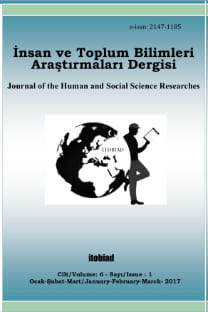Down Sendromlu Çocuğa Sahip Annelerin Destek İhtiyaçlarının Ve Destek Kaynaklarının Belirlenmesi
Bu çalışmada, dünyada ortalama her 600 doğumda bir oranıyla, en sık görülen kromozom anomalisi olan Down Sendromuna sahip çocukların annelerinin destek ihtiyaçları ve destek kaynaklarının belirlenmesi amaçlanmıştır. Bu amaçla Down Sendromlu çocuğa sahip Ankara ilinde yaşayan 13 anne ile yarı yapılandırılmış açık uçlu mülakat yöntemi ile görüşmeler gerçekleştirilmiştir. Betimsel ve sistematik analizle değerlendirilen verilerden elde edilen sonuçlara göre, annelerin, temel destek ihtiyaçları fiziksel iş yükünde destek ihtiyacı, derdini paylaşma, anlaşılma ihtiyacı, manevi bakım desteği ihtiyacı, sağlık bakım/bilgilendirilme desteği ihtiyacı olarak belirlenmiş olup, destek kaynakları içsel ve dışsal kaynaklar olarak iki kategoride değerlendirilmesi uygun görülmüştür. Buna göre, eşten ve çocuklardan görülen destek, geniş aileden görülen destek, komşulardan ve arkadaşlardan görülen destek ve kurumsal destekler, dışsal destek kaynakları olarak belirlenirken, anlam bularak kendini destekleme ve bilgece değişim yaşama ise, içsel destek kaynakları olarak değerlendirilmiştir.
Anahtar Kelimeler:
Down Sendromu;Engelli anneleri; Sosyal Destek; Manevi Bakım Desteği
Assessing the Needs and Sources of Support of Mothers with Down Syndrome Child
Down syndrome is one of the most frequent chromosomal anomaly happens in the world. One out of 600 children in the world borns with this particular abnormality. The purpose of this study is to assess the needs and the sources of support of mothers with Down Syndrome (DS) child. Therefore, semi-structured and open ended interviews were conducted with 13 mothers with DS child, living in Ankara. systematic analysis of data reveal that mothers with DS child need support to overcome physical work load; to talk about their misery; need to be understood; need to be physical/mental and spiritual care; and need to be informed. To meet these needs, supporting sources determined under two categories: internal and external. Making sense of the situation and being able to change classified as internal sources. Support from spouse, other family members, friends, neighbors and institutional supports considered as external resources.
___
- Ayyıldız T, Şener DK, Kulakçı H, Veren F. Zihinsel engelli çocuğa sahip annelerin stresle baş etme yöntemlerinin değerlendirilmesi. Ankara Sağlık Hizmetleri Dergisi 2012;11(2):1-12.
- Baltaş, Z. (2007). Sağlık Psikolojisi. Halk Sağlığında Davranış Bilimleri. İstanbul: Remzi Kitabevi.
- Bilgin, S.,Gozum, S. (2009). Reducing burnout in mothers with intellectually disabled child: An education programme. Journal of Advanced Nursing, 65: 2552-2561.
- Demirbilek, M. (2013). Zihinsel Engelli Bireylerin ve Ailelerinin Gereksinimleri.Turkish Journal of Family Medicine and Primary Care.
- Eruygur, Ö.T.,YamalıYürekli Aşk, Büyülüdağ Yay., 2012
- Gourounti, K.,&Sandall, J. (2011). The validation and translation of Multidimensional Measure of Informed Choice in Greek. MIDWIFERY, 27(2), 170-173
- House, J. S. 1981. Work Stress and Social Support. Reading, Mass: Addison-Wesley
- House, J. S. 1986. Social support and the quality and quantity of life. In Research on the Quality of Life, ed. F. M. Andrews, pp. 254-69. Inst. Soc. Res. Monogr. Ser.,AnnArbor: Univ. Mich
- Kaner, S. (2004). Engelli çocukları olan anababaların algıladıkları stres, sosyal destek ve yaşam doyumlarının incelenmesi. Ankara Üniversitesi Bilimsel Araştırma Projesi kesin raporu, http://acikarsiv.ankara.edu.tr/eng/browse/498/798.pdf?Show (29.04.2011).
- Kaplan, H., “İlahi Alalet” Psikolojisi, Ekspres Yay., 2010
- Kleinveld, J. H.,Timmermans, D. R. M., de Smit, D. J., Adér, H. J., van der Wal, G., & ten Kate, L. P. (2006). Does prenatal screening influence anxiety levels of pregnan twomen? A longitudinal randomised controlled trial. Prenatal Diagnosis, 26, 354-361.
- Leahy-Warren, P., G. McCarthy, et al. (2011). First-Time Mothers: Socia lSupport, Maternal Parental Self-Efficacy and Postnatal Depression.Journal of Clinical Nursing
- Neely-Barnes S, Marcenko M (2004). Predicting impact of Childhood disability on families: Results from the 1995 National Health Interview Survey Disability Supplement, Mental Retardation, 42(4): 284.293)
- Özcanarslan, F. T., Karataş, H. T., & Aydın, D. T. (2014). Şanlıurfa ilinde engelli çocuğa sahip Annelerin depresyon durumlarinin belirlenmesi. Harran Üniversitesi Tıp Fakültesi Dergisi, 11(2), 75.
- Pelchat D, Ricard N, Bouchard JM et al. (1999).Adaptation of parents in relation to their 6-month-old infants type of disability, Child: Care, Healt hand Development,25(4):377-397.
- Rodoplu, S., Facebook(Down Sendromu Aileleri Sayfası),2013
- Ryan, S.,Runswick-Cole, K. (2008) Repositioning Mothers: Mothers, Disabled Children and Disability Studies, Disability and Society, 23 (3): 199-210
- Sen, E., Yurtsever, S. (2007). Difficulties experienced by families with disabled children. JSPN, 12: 238-252.
- Siklos, S.,&Kerns, K. A. (2006). Assessing Need for Social Support in Parents of Children with Autism and Down Syndrome. Journal Of Autism And Developmenta lDisorders, 36(7), 921-933.
- Skirton, H.,&Barr, O. (2007). Influences on uptake of antenatal screening for Down syndrome: A review of the literature. Evidence Based Midwifery, 5, 4−9.
- Şengül S, Baykan H. Zihinsel engelli çocukların annelerinde depresyon, anksiyete ve stresle başa çıkma tutumları. Kocatepe Tıp Dergisi 2013; 14(1):30-9.
- Tapan, E.Ben Mutlu Bir Down Annesiyim .YKY, 1995
- Tsai, S. M.,Wang, H. H. (2009). The relationship between caregiver’s strain and social support among mothers with intellectually disabled children. J ClinNurs, 18: 539-48.
- Van Riper, M. &Cohen, W: (2001). Caring for children with Down syndrome and their families. Journal Pediatric Health Care, 15, 123-131.
- Weiss, M. J. (2002). Hardiness and social support as predictors of stress in mothers of typical children, children withautism, and children with mental retardation. Autism, 6, 115-130.
- ISSN: 2147-1185
- Yayın Aralığı: Yılda 4 Sayı
- Başlangıç: 2012
- Yayıncı: Mustafa SÜLEYMAN ÖZCAN
Sayıdaki Diğer Makaleler
Kemal Tahir'de Sosyalizm ve Batılılaşma Eleştirisi
İmam Mâtürîdî''ye Göre Ehl-i Kitap'la İlişkilerin Dinî Temelleri
Müşterinin Gizlilik Davranışları ile İlişkili Faktörlerin Belirlenmesi
Organizasyon Başarısı: Liseler Dünya Hentbol Şampiyonası Örneği
İlk İslam Toplumunun İnşa Sürecinde Kardeşlik Projesi
Dört Farklı Perspektiften İslam Demokrasi Tartışmaları
